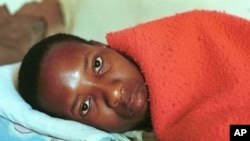In June a U.N. high-level meeting on HIV/AIDS renewed the commitment to provide universal access to treatment and care. The goal is to reach 15 million people by 2015. But is that goal truly attainable with millions more expected to need antiretroviral drugs in coming years?
“We’re a lot closer than we used to be, I think we can say with quite a bit of confidence,” said Christine Stegling, associate director at the International HIV/AIDS Alliance in Brighton, England, and senior advisor on human rights.
Nevertheless, she said even if that number is reached, it would still be only 80 percent of those who need treatment.
“So there is a treatment gap, but I think against all the odds we have made a lot of progress in terms of getting people in lower and middle income countries onto antiretroviral treatment,” she said.
The HIV/AIDS epidemic is now 30 years old. It’s estimated more than 33 million people are living with the disease.
Same goal, different numbers
At the 2005 G8 summit in Gleneagles, Scotland, leaders first pledged to achieve universal access by 2010.
“The target was set with a certain cutoff point in mind. I think at the time it was people with a CD4 count below 350 would get on treatment and that’s what we based the targets on," said Stegling.
The fewer the number of CD4 cells immune system cells, the greater the vulnerability to opportunistic infections and cancers.
“Now, the targets for starting treatment have lowered considerably, which obviously widens the group of people who need to be on treatment. Then obviously, over a period of time, there will be more people on treatment. People live longer. And…at the same time if we don’t considerably prevent new HIV infections, obviously that group of people who has to be on treatment will rise over time,” said Stegling.
There’s growing evidence that the earlier HIV-infected people receive antiretroviral treatment, the better their long-term prospects and the less likely they are to infect others.
Spend wisely
The global recession has caused countries to scale back their funding commitments to HIV/AIDS.
“There is an issue around money, but obviously it is also about identifying the best ways of resourcing treatment and getting cheaper treatment in terms of finding new and innovative ways of providing treatment to people, which may not be brand name drugs. It may be drugs that are provided at a considerably lower price,” she said.
Marginalized groups
Health officials and activists say treatment must be aimed at groups that are typically marginalized and victims of stigma and discrimination, namely men who have sex with men, sex workers and injection drug users.
“This is the big breakthrough of the new declaration,” she said, “If we do not reach out to those most marginalized and often most at risk of HIV infection, we’re not going to win the fight against HIV, especially in Africa.”
But that may be easier said than done. Some African countries have strict anti-homosexual laws. The Ugandan parliament recently considered a bill that would have imposed the death penalty for certain acts. It was widely condemned by the international community. No vote was taken on the bill, but it could be reintroduced.














